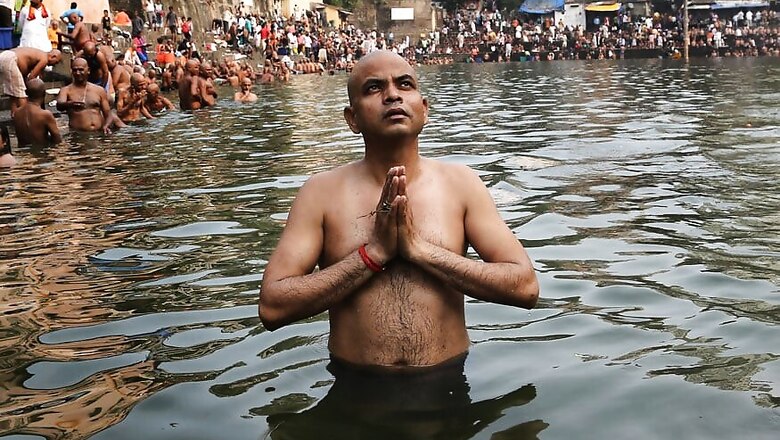
views
It is that time of the year again when a ripple of white (the autumnal Kaash flower) plays through the emerald green of meadows and the smell of clay permeates the narrow by-lanes of an artisan's neighbourhood.
Artists diligently work through the night giving finishing touches to the clay replicas of the ten-armed Goddess Durga and her children as they make their way from Kailasha to spend few days at her paternal place amid celebrations while a sense of euphoria, nostalgia and warmth dominates the human essences. As the slightly-chilly morning air reverberates with the sound of the auspicious conch shells, the heart skips a beat with the realisation that Durga, the Goddess, the Mother and the Daughter is not far behind.
Durga Puja is not just a celebration, it is a spirit of solidarity that breaks boundaries of caste, creed and religion bringing people together as a mother would into celebrating life itself. And what better way to know that a celebration of epic proportions is underway when the entirety of a community wakes up in the wee hours of October to herald the homecoming of the Goddess Durga.
Mahalaya marks the end of Pitru Paksha and the beginning of Debi Paksha. A time when Bengalis across the world wake up to the echoes of Birendra Krishna Bhadra's timeless chants and the soul-stirring tunes of the songs of 'Mahishasur Mardini' – the annihilation of the buffalo-headed demon.
An invocation to Goddess Durga to begin her descent towards the mortal realms, Mahalaya is celebrated a week prior to the commencement of festivities and is intricately associated with the radio broadcast of Mahisasurmardini — a program that was first broadcast live on All India Radio in the early 1930s.
An eternal montage of devotional songs, classical music and the recitation from the scriptural verses of Sri Chandi or Durga Saptashati in the haunting voice of the late Birendra Krishna Bhadra, Mahisasur Mardini narrates the invocation of Goddess Durga who was brought forth by the Gods to defeat the all-powerful demon Mahisasura.
Interestingly, Birendra Krishna's Mahishasur Mardini has been playing since 1932. Once in 1977, Bengali superstar Uttam Kumar had attempted voicing the legendary verses, but he was so severely criticised that the All India Radio went back to playing the voice of Birendra Krishna Bhadra.
Scripted by Bani Kumar and composed by Pankaj Mallik, Mahalaya is an invocation of the Goddess Durga and the celebration of good over evil. The timeless songs have been rendered by the likes of Hemanta Kumar, Arati Mukherjee and Manabendra Mukherjee.
Years have passed since the demise of the legendary Birendra Krishna Bhadra and the live broadcast of the show has long since been halted. However, tradition prevails and people, young and old wake up in the wee hours of Mahalaya morning to tune into a pre-recorded version of the audio-drama.
Despite standing at a juncture where the cultural identity of people is slipping away due to mass westernisation and cultural infighting among citizens of the same country, Mahalaya remains a steadfast constant that is terribly reassuring. Transcending from being a mere audio-drama to a prayer-of-sorts, Mahisasur Mardini remains an integral part of our culture which is a gentle reminder that Durga Puja is not just a spirtitual festivity but rather is grounds for a spiritual reawakening, a reminder of one’s roots and soulful solidarity with others.




















Comments
0 comment